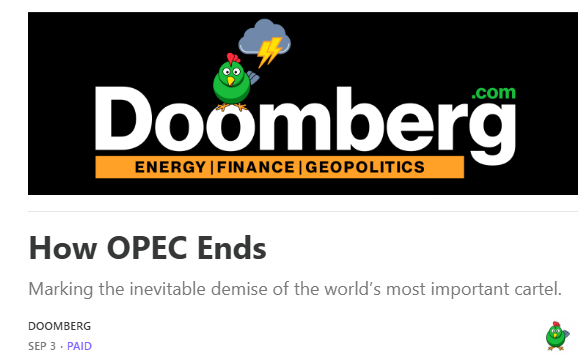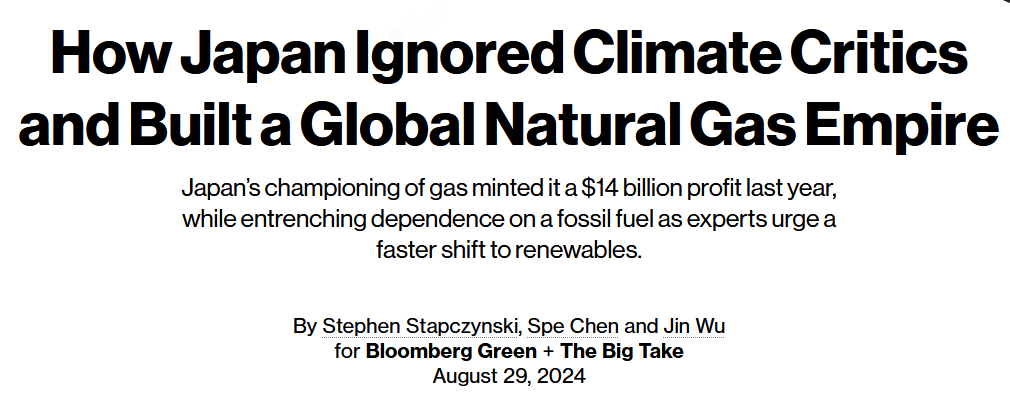The inexorable rise of natural gas and the parallel decline of oil
Rising energy needs and BTU arbitrage make natural gas the best bet
In a fascinating recent article, Doomberg makes the case for the eventual decline of the Organization of Petroleum Exporting Countries (OPEC).
Rising oil production in United States, Canada and Guyana and defectors from OPEC like Ecuador have weakened the cartel’s control over oil supply, while the world’s growing energy demand is turning towards natural gas over oil as a result of the “energy arbitrage” where at Henry Hub $2.00 per Mcf and West Texas Intermediate at $72 a barrel, natural gas BTU’s cost 83% less than oil BTU’s.
It is an immutable law of nature that world economic growth compels greater energy consumption, at least in my opinion (supported by centuries of history). The demand for energy is accelerating as third world economies develop and the emergence of artificial intelligence (AI) technology has fueled sharply rising demand for data centers which are energy hogs. At the same time, vehicle technologies are shifting away from internal combustion engines that burn either gasoline or diesel fuel towards vehicles powered by electric motors and natural gas.
Natural gas? Yes. First, there will be a need for trillions of dollars of investment in the worldwide electrical grid to provide enough power to charge millions of electric vehicles (EV’s) and thousands of large scale data centers and despite the leftist preference for costly and unreliable so-called “renewables” there is little option to supply the needed energy other than coal, nuclear and natural gas. Coal and nuclear are under pressure from pretend “environmentalists” who claim carbon dioxide causes climate change (an absurd claim) and that nuclear carries catastrophic risks, so expanded use of coal is taking place primarily in China and India who don’t buy the the “climate change” charade (but pay lip service to it while building new coal fired power plants almost every week) and nuclear’s renaissance seems decades away.
Natural gas is in effect the power source for EV’s, whether the climate nutters on the left like it or not, and natural gas is the likely source of electricity for data centers. EV’s are not the only vehicles that create higher demand for natural gas - in China, one in three long range transport trucks is powered by a natural gas engine.
The glut in natural gas depressing North American prices for the commodity arises from two main forces - the highly productive use of “fracking” to drill for gas in the gas prone shale reservoirs of United States and Canada and the associated natural gas which comes as a by-product of “fracking” for oil in shale basins like the Permian. Over the longer term, it iseems inevitable to me that oversupply of oil will drive down oil prices while “energy arbitrage”, increased adoption of EV’s and an accelerating build out of data centers will see natural gas prices tend to rise. If that happens, and oil prices fall far enough to make it uneconomical to drill in the Permian (for example), less oil output will shrink the supply of associated gas tightening gas supplies while demand keeps rising.
Japan is in the vanguard of countries that saw the worldwide natural gas market accurately and planned for its growth, building a natural gas based heavy industry to support its own energy needs and to supply the world with liquified natural gas infrastructure such as LNG carriers and related equipment and supplies. With little natural gas of its own, Japan has emerged as the world leader in the LNG industry with more net income earned from its LNG businesses than its consumer electronics in the past year. Bloomberg claims Japan “ignored” the climate crisis which is nonsense - there is no “climate crisis” to ignore and Japan is wise enough to realize that is the case.
In parallel with Japan’s rise as an LNG superpower, Canada (with among the largest natural gas reserves on Earth) has languished as an LNG supplier owing to the inane policies of its leftist Prime Minister who has met requests for Canada to supply LNG to Germany and Asia with his famous comment: “There is no business case for LNG”. The benefit of our democracy is that we get to elect who we want. The liability of our democracy is we are stuck with the fools we elect (at least for a few years).
Back to the main point of this article - the unfolding energy world is heading to a period of surplus supplies of oil and tightening markets for natural gas and energy invetors should face reality and not stand in front of a freight train by steadfastly hanging on to the Eric Nuttall template that oil prices have nowhere to go but up. One factor that seems to me important is the U.S. Presidential election. If Harris wins, expect constraints on U.S. oil & gas output in some form and don’t buy her recent claim that she won’t “ban fracking” which, even if true, would be a careful choice of words since there are plenty of tools she can use to cause the same outcome without enacting a “ban”. If Trump prevails, his “drill baby drill” will upset the OPEC apple cart, drive down oil prices, and fuel world economic growth which in turn will see rising demand for - you guessed it - natural gas.
In our odd and sometimes perplexing political world, ballot box choices have consequences. A Harris victory might see enough of a drop in U.S. oil production that Nuttall will be proven right and prices rise, while a Trump win could do the opposite. November is almost upon us so watch the polls carefully and make up your own mind what the impact on your energy portfolio may be. For me, I care less who wins from an investment perspective and weight my energy holdings towards profitable, well-managed natural gas names like Peyto, Birchcliff, Spartan Delta, Logan, and Bonterra, and limit my oil exposure to deeply undervalued names like Rubellite and Saturn.





Great analysis.
You, sir, are a visionary!
Appreciate all your thoughtful and forward-thinking posts.